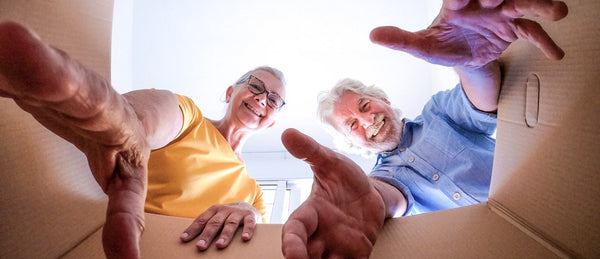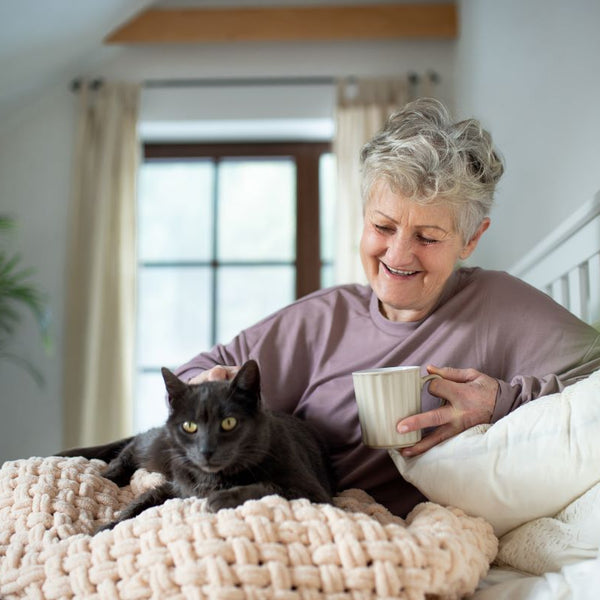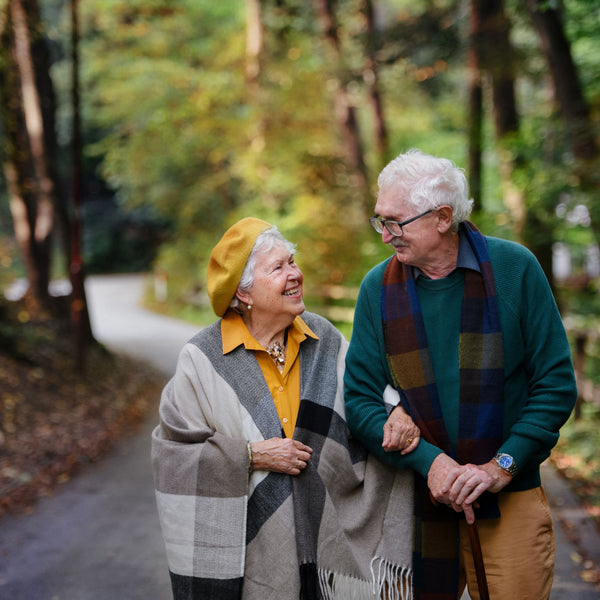The colder months bring with them higher risks for older adults, whether directly or as a consequence of other factors at this time of year. It’s important to identify seasonal hazards, especially if the older person lives independently or on their own, to help minimise the chances of them being injured or becoming ill.
Jump to:
- Common home hazards for elderly people in winter
- Other environmental hazards for elderly people in winter
- Home safety tips for older adults in winter
Common home hazards for elderly people in winter
While there are potential hazards that exist all year round in our homes, the colder months can mean that there are other risks to consider as well, especially for older people who may not be as mobile as they used to be. Some of the most common hazards for elderly people in winter can include:
Fire risks or trip hazards from portable heaters
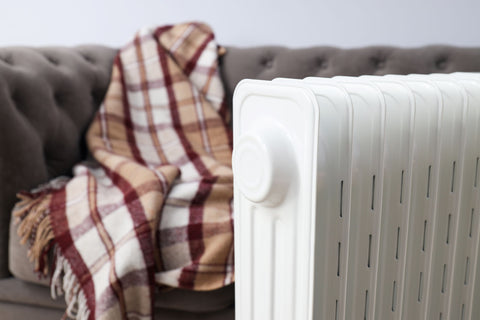
While portable heaters can offer a useful way to heat just one room or area of the home in winter and can easily be moved to where they are wanted, they can also be a fire risk if they are placed too close to furniture, soft furnishings or other belongings in the property.
Portable gas fires, usually powered by refillable bottles, can also carry a carbon monoxide risk and shouldn’t be used indoors. Halogen heaters or oil-filled heaters can also pose risks, but when used according to instructions and well-maintained, can be suitable for indoor use.
Electric portable heaters, which need to be plugged into a socket, often leave trailing wires, which can be a trip hazard. The heaters themselves, especially if quite small, can also be a trip hazard if the older adult living in the home isn’t used to them being there or if the heater is moved into different places at times.
Hypothermia
With high energy costs, many households are cutting back on using the heating to save money, but this can be a real risk, especially for older people in the home. As we age, our bodies lose some of our ability to regulate temperature as well. Along with some elderly people being less able to move around and stay active or have easy access to extra layers of clothing, food and warm drinks whenever they want, this can put older people at greater risk of hypothermia in cold conditions.
Hypothermia can be very serious, even fatal, so it’s very important for older people to stay warm during the winter.
Find out more about the risks of low temperatures to older adults.
Extra clothing and layers can inhibit mobility
A way that many older people stay warm at home in the winter, along with using the heating when needed, is to wear several layers of clothing and have extra blankets on chairs, sofas and beds. While this can be a good way to help avoid risks of hypothermia, wearing lots of layers can also make it more difficult for older people to move around the home. In addition, things such as blankets falling on the floor or getting wrapped around the legs can also be a trip hazard, so it’s important to ensure that the older person is still able to move around freely when needed.
Dehydration
While many people associate dehydration with summer and warmer weather, it’s actually a major risk for elderly people during the winter too. Many older adults drink less in the winter to avoid having to get up and go to the kitchen or toilet as often, and having the heating on can also contribute to dehydration.
Find out about the risks, signs and symptoms of dehydration in the elderly.
Other environmental hazards for elderly people in winter
Along with hazards and risks in the home, there are also other environmental factors to consider for older people in the winter. These include:
Shorter and darker days affecting the ability to see hazards clearly
Many older people experience changes to their eyesight and eye health. These may not be serious enough to prevent them from doing their normal activities, but in winter, when the daylight hours are shorter and the sunlight is not as strong, it can increase the risks of an older person not seeing trip hazards in the home or when out and about.
Icy and slippery surfaces around the outside of the home and garden
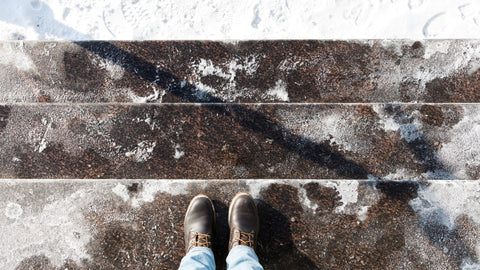
Icy and slippery paths can be a real fall hazard for older people during winter, as it’s not always something that is easy to see until it’s too late. Whether it’s stepping outside of the front door or pottering around the garden during the colder months, the risks of having a fall can be that much higher during the winter.
Home safety tips for older adults in winter
We’ve compiled some tips to help minimise the risks of elderly people having falls or other accidents during the winter months.
Ensure there is adequate lighting inside and outside the home
With little natural light around at this time of year, ensuring good lighting is fitted inside and around the home can make a big difference if an older loved one struggles to see a potential trip or slip hazards otherwise. Motion-detector lights could be fitted to the outside of the home so that no one has to remember to turn the light on or off.
Homes should be kept at a minimum of 18°C
To minimise the risks of hypothermia, it’s recommended to keep the temperature in the home at a minimum of 18°C. As long as they can be used safely, things such as hot water bottles and electric blankets can also help keep older people warmer during the winter.
Grit and sweep paths outside regularly
Fallen leaves and other debris, along with ice when the temperatures fall below freezing, can make paths, steps and outdoor walkways treacherous for elderly people to walk on. Keeping them swept clear of leaves and gritted regularly when colder weather is expected can make a big difference and minimise the risks of a fall.
Fit monitored smoke alarms
If your older loved one wants to use portable heaters at home, or even if they’ll use central heating instead, it can bring real peace of mind to everyone if smoke detectors are not only installed and working, but also monitored. A monitored smoke alarm system means that an alert is raised if smoke is detected in the home. Smart home monitors and home monitoring systems for the elderly can also detect temperature changes.
Personal alarm
For an older person who lives independently or alone, a personal alarm system can also bring peace of mind. It means that if the wearer needs assistance at any time, all they need to do is press the alarm button and help is there, 24/7. Useful all year round, a personal alarm system can be an extra layer of assistance during the winter, when family and friends often worry more about elderly loved ones.
It’s important to choose the right alarm system for your lifestyle, which includes the features that suit your circumstances, such as automatic fall detection, built-in GPS location detection or a waterproof device that can be worn in the bath or shower. Our team can help make sure you choose the right product for your situation. Call us on 0800 085 7371 for tailored advice.





